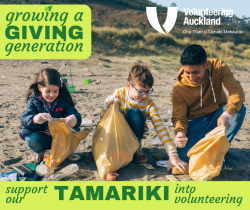Growing the giving generation: Supporting children aged 5–12 into volunteering

In Aotearoa New Zealand, volunteering is woven into the fabric of our communities — from the whānau-led events at kura and kōhanga, to local clean-up days, to marae and church service. But while many adults give their time generously, the next generation of volunteers will only emerge if we create early opportunities for tamariki to experience the joy, connection and purpose that volunteering brings.
Children aged 5 to 12 are at a formative stage — naturally curious, eager to help, and beginning to understand the world beyond their own experience. Introducing them to volunteering now, in ways that are fun, safe and meaningful, can lay the foundations for a lifelong volunteering ethos and a stronger sense of citizenship. Involving children in volunteering also strengthens whānau bonds and instils values of manaakitanga, aroha and collective responsibility.
Why Volunteering Matters for Tamariki
In Aotearoa New Zealand, we often say “it takes a village” — and volunteering is how that village comes alive. For tamariki, volunteering helps them learn that their time and effort have value. It nurtures empathy, social responsibility, and a sense of belonging.
Through volunteering, children can:
- Build confidence and communication skills
- Develop a strong sense of purpose and identity
- Learn about diverse people, places and needs in their community
- Gain early experiences that prepare them for teamwork and leadership
- Connect with others in a way that strengthens mental wellbeing
Importantly, volunteering connects children to our shared cultural values — ideas of looking after others, caring for Papatūānuku (the earth), and standing up for what is right.
How Whānau Can Get Involved
Parents, grandparents, caregivers and wider whānau play a vital role in introducing tamariki to volunteering. Children model what they see. When they see adults in their lives giving back, they learn that contribution is a normal and fulfilling part of life.
Here’s how families can support young children in getting involved:
1. Volunteer together
Look for community activities where tamariki can join in — like planting trees with local conservation planting days, helping at a school gala, or supporting a fundraiser for a local kaupapa or cause.
2. Keep it age-appropriate
For younger tamariki, small tasks like picking up litter at the park or baking for a neighbour can be powerful first steps. As they get older, they can take on more responsibility.
3. Choose causes they care about
Whether it's animals, the environment, homelessness or sports, starting with what your child is passionate about will help keep them engaged.
4. Reflect afterwards
Talk about what you did and why it mattered. Ask what they enjoyed or found challenging. This helps deepen their learning and sense of contribution.
5. Celebrate their mahi (work)
Let your child know their help was appreciated — whether through words, photos, a certificate, or simply a big hug and a "ka pai!"
What to Look for in an Organisation
When looking for suitable volunteering opportunities for tamariki in Aotearoa New Zealand, keep these things in mind:
• Child-friendly environments: Are the staff welcoming and able to work with children?
• Supervised and safe: Will you or another trusted adult need to be present the whole time?
• Short and flexible: Does the opportunity allow for short attention spans and other family commitments?
• Clear purpose: Can the child understand why they are doing the task and who it helps?
• Kaupapa-aligned: Does the organisation uphold values that reflect your own whānau tikanga and world view?
Volunteering Ideas by Age
Volunteering should evolve with the child’s age and interests. Here are some local examples:
Ages 5–7
- Collecting acorns or shells for craft packs for aged care residents
- Making cards or drawings for hospital patients through initiatives like “Send a Smile”
- Helping pack school lunch donations with parental help
- Gardening at home and gifting produce to neighbours or a community pantry
- Joining a whānau-led beach clean-up or tree planting day
Ages 8–10
- Supporting a local foodbank by collecting tins from neighbours
- Participating in SPCA fundraising events or donation drives
- Helping run a sausage sizzle or bake sale for a school or sports club fundraiser
- Writing thank-you notes for emergency service workers
- Participating in tamariki-led campaigns through organisations like Plunket and Save the Children NZ
Ages 11–12
- Being a peer buddy for younger children at school or after-school programmes
- Helping digitise old photos or books for a local historical society or marae
- Volunteering at local clean-up events via groups like Sustainable Coastlines
- Assisting at community events such as Matariki celebrations or Waitangi Day gatherings
- Developing youth-focused social media content for a community cause
The Role of Schools and Community Groups
Schools, churches, marae, and sports clubs are ideal starting points for child-friendly volunteering. Many schools already encourage service through environmental groups, buddy systems, or student leadership roles. Strengthening these initiatives with clear pathways for whānau involvement can multiply the benefits.
Organisations like Volunteering Auckland, and regional Volunteer Centres can also help connect families with child-appropriate opportunities.
Final Thoughts: Growing a Volunteering Culture
Instilling a volunteering ethos in tamariki is one of the most powerful ways we can future-proof our communities. It teaches young people that they have the power to make change — not when they’re older, but right now.
Whether your child is making cards for kaumatua, planting native trees, or helping raise funds for a school project, they are learning what it means to care. With the guidance of whānau and community, they begin to understand that their actions matter — and that giving back is part of what makes Aotearoa such a special place to live.
Volunteering isn't just something children do. It's something they become. Let's give them every opportunity to grow into the generous, connected, and capable people our future needs.

